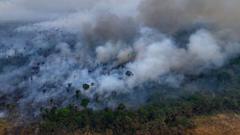**The world's tropical forests suffered the highest recorded loss last year, emphasizing the urgent threat they face from climate change and human activities, as experts warn of potential irreversible impacts.**
**Tropical Forests Face Unprecedented Loss Amid Climate Crisis**

**Tropical Forests Face Unprecedented Loss Amid Climate Crisis**
**New satellite analysis reveals record rates of tropical forest destruction as fires surpass agriculture in driving deforestation.**
The latest satellite analysis has revealed a staggering loss of the world's tropical forests, which act as a critical buffer against climate change, at an unprecedented rate. Researchers report that in 2024 alone, around 67,000 square kilometers (approximately 26,000 square miles) of these vital ecosystems vanished—a figure comparable to the entirety of the Republic of Ireland or equivalent to losing 18 football pitches every minute.
Fires emerged as the primary driver of this destruction, surpassing agricultural land clearances for the first time on record. This devastating trend was particularly pronounced in the Amazon rainforest, which faced its worst drought on record, exacerbated by climate change and the natural El Niño weather phenomenon.
While the findings are alarming, there are glimmers of hope from South East Asia, where government policies have successfully reduced the rate of deforestation. In Indonesia, for example, primary forest loss decreased by 11% despite drought conditions, highlighting the potential effectiveness of enforcing "no burning" laws.
Tropical rainforests, such as the Amazon, are critical as they store vast amounts of carbon, but the escalating deforestation raises concerns about their resilience on a warming planet. Some researchers predict that certain regions, particularly parts of the Amazon, are nearing a "tipping point," where a switch from old-growth forests to savanna could become irreversible.
“We could be heading towards a scenario of 'savannisation', where the rainforest is irreparably damaged,” stated Professor Matthew Hansen, co-director of the GLAD laboratory at the University of Maryland. Such outcomes would not only threaten the diverse wildlife inhabiting these forests but could also have dire implications for global climate stability.
The loss of old-growth tropical forests has led to the release of 3.1 billion tonnes of greenhouse gases this year, a figure that parallels the emissions produced by the entire European Union. The current climate situation reflects a new phase, where the intensity of tropical fires driven by climate change is outpacing traditional agricultural clearing methods.
Despite these concerning trends, experts emphasize that ongoing political commitment and international cooperation are pivotal in preserving remaining ecosystems. Initiatives like rewarding countries for maintaining tropical forests through conditional payments are being discussed in the lead-up to the UN climate summit, COP30, which will focus on protecting our planet's precious resources.
As discussions unfold, the key takeaway remains: without consistent protection and efforts to halt emissions, the future of the world's tropical forests hangs in the balance.




















